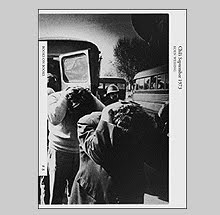The Book of Beth and Picture Imperfect by Kent Klich

Almost twenty years ago the photographer Kent Klich released a book on a woman named Beth R. who was an addict and prostitute living in Sweden. The Book of Beth published by Aperture was an unnerving portrait of trust and intimacy between a photographer and subject or rather, between two friends. Shot over the course of three years in the mid-80s, Klich describes the spiral of hardship this one woman faces without moralistic tone or even triumph over the adversity.
Sharing certain conventionality with other photojournalistic books documenting difficult lives or situations, The Book of Beth shocks the viewer at first due to the shattering of any barrier to intimacy. It is undeniable that on one level it is a voyeuristic look into a life, a life so depressingly described that we breath a sigh of relief that we have not had to live through what she has. It's subject is so extreme that for the viewer it is easier to step away and see Beth as 'the other,' and not come away reflecting on the destructive dependency that nearly everyone holds somewhere in their lives.
This darkside of humanity has a magnetism for photographers and in the worst examples they are triumph over adversity, human interest stories that reduce complex physical and emotional relationships down to the lowest common denominator. Beth's story is in some ways so dangerously cliche, full of the destructive foundations that set the scene for what follows; abused as a young girl by her mother, spent much of her childhood in and out of various foster care facilities, and perhaps the most horrifying event that can link her later life - turned out as a prostitute by her own mother. Luckily, either by Klich's doing or by Beth's strong presence, she is not reduced to stereotype but expanded into a full person we may connect on some level with. The Book of Beth presents all of this material including doctor's reports and personal text by Beth, weaving all into a collaborative autobiography that shows both vantage points of an inner and outer life simultaneously.
Since 1983 when they first met Klich and Beth have remained friends and this year sees the release of another visit to Beth R's story in Picture Imperfect published by Journal.
Again Beth and Klich act as collaborators in assembling a disturbing family album that explores the early influence of home on what we become later in life. Using childhood photographs interspersed with Kent's early black and white and more recent color images, they expand her self-portrait to explore that disfunctional parent child bond.
It is through the disconnect of these traditional family album photos and the newer portrait os the addict/prostitute that we reflect upon what lies under the surface of appearance in photographs or appearances in general. In the photos, Beth's mother certainly doesn't look like a woman who would prostitute her own child but then human nature is far more complicated than one's ability to momentarily smile at a camera.
In Picture Imperfect, Beth is now clean and has been living with a man named Kim for the past ten years. It is not the happy ending one wishes for as she seems to do daily battle with depression and constant pain but it is an improvement. Like the transformation that Beth is going through, Klich has gone through one himself. Switching from the language of traditional documentarian, his newer color images are less obvious and more metaphoric. The sequencing of the images lends to a mix of flashback and fast-forward that keeps the connection to history fresh and full of tension.
The book comes with a DVD called Beths Dagbog (Beth's Diary) which was partially shot by Beth and completed in 2006. It is here that we get a better sense of her feelings towards her mother as part of the 30 minute documentary is centered around the mother's request for Beth to come see her for her 80th birthday. Beth's anger bordering on hatred after agreeing to be present is a raw and self protecting response to the constant open wound that has never healed. The actual meeting is not shown but her tone afterwards of seeing her mother, now blind and alone, is one of pitying her for her mistakes. It is not necessarily a moment of forgiveness but perhaps an important moment necessary for moving on.
My only complaint with the film is the use of sorrow filled music at certain moments when it is simply not necessary. We know this is a difficult biography as it is permanently etched into Beth's face and features. The toll of hard living shows in her expression, we do not need artificial prompting of our sensations.
Several books have used the concept of the family album to shape a narrative of a life and although it may seem an obvious choice for this work, it works very well. It achieves a shaping of the content that isn't overwhelmingly difficult to experience while remaining unflinching in its honesty. The first release, The Book of Beth flirted at the edge of such a chasm, that like Jessica Dimmock's The Ninth Floor, you may not want to spend much time with its pages.
The revisiting of Beth's story twenty years later for some skeptics may feel forced. Often photographers have revisited older subjects and they feel less like an update on the subject than a desire for the photographer to revisit the freshness of their earlier work. That isn't the case here as one senses the thirty year relationship between these two people would have been a constant whether a camera was present or not. Besides her decade long life with Kim which seems extremely healthy and supporting, this other with Klich has contained additional love and respect, neither of which unrequited.
Note: If anyone knows the website for Journal can you pass it along.











